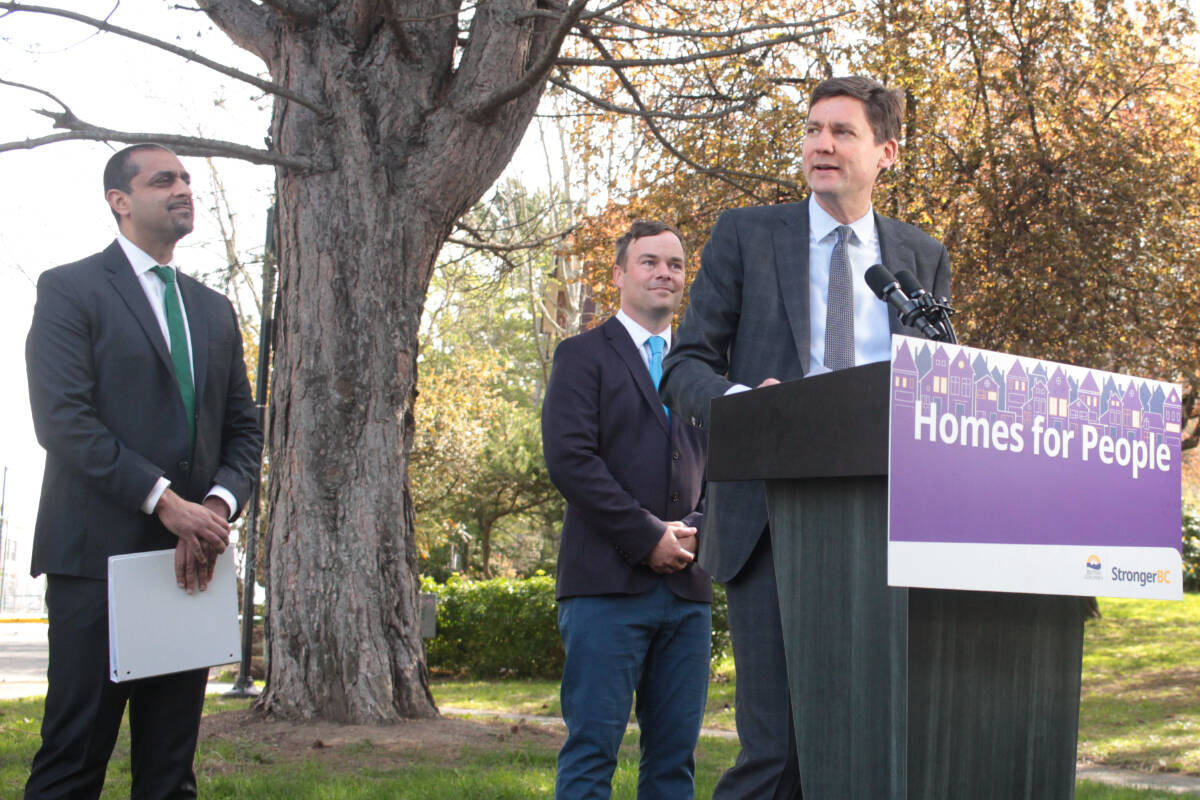Tenants’ rights advocates in B.C. are applauding provincial action to limit “bad-faith” evictions and put more restrictions on rent increases for people who add a child to their household.
“We had a very good morning,” said Antonia Mah of the Together Against Poverty Society on Tuesday (April 2) afternoon, following Premier David Eby’s announcement of the new legislation.
“It just really shows the Eby government is committed to doing some very forward-thinking things for tenants and putting in legislation changes we’ve been advocating for for years.”
The changes will tweak tenancy laws to ban personal occupancy evictions in purpose-built rental buildings with five or more units, increase the amount of time a landlord must occupy those units from six to 12 months, forbid rent increases when a child moves into a unit and prohibit frivolous eviction notices.
Notice times and compensation amounts for tenants who are evicted for landlord’s personal use of a unit will also change, and landlords using the provision will be forced to generate the eviction notice through a tenancy branch web portal.
Mah is particularly pleased about the new rules restricting landlord’s personal use to larger rental buildings as well as the new portal that she hopes will better inform landlords and therefore limit wrongful eviction attempts.
Whether these new rules will help solve the problems of the three renters profiled last week by Black Press Press Media remains to be seen, and may depend how this legislation is put into force.
In Victoria, Mary Thompson had described how she was evicted from the apartment she shared with her daughters so her landlord’s mother could move into the unit. Thompson said the owners just used this as an excuse to renovate the unit and rent it out for more than double what she had paid.
READ MORE: Told to get out: No-fault evictions ensnare renters in Victoria and beyond
Under the new rules, that landlord would need to go through the web portal to generate the eviction notice, and would not be able to re-rent the unit for at least a year. The government has also announced there will be potential audits of these types of evictions, so the owners could face consequences for not following the rules.
But if the landlord’s mother did move into the unit for one year, then Thompson would still have had to move out.
For Nanaimo’s Robert Fulton who is disabled and cannot work, and who has faced multiple attempts to oust him from his unit so the landlord can move a caretaker in, it is unclear what to expect.
Fulton did successfully dispute two eviction attempts because he was able to cast doubt on the landlord’s intentions, but there is nothing in the new regulations specifically prohibiting evicting a person to move a caretaker in.
The new rules do ban the serving of frivolous eviction notices, which may prevent his landlord trying again after losing the disputes, but how this will be enforced is unclear.
“We’re going to be able to step in on those circumstances and make sure the landlord knows that ‘listen you lost on this case, you can’t continue to try to harass the person out,” said Vancouver-West End MLA Spencer Chandra Herbert, who was at the announcement as the premier’s liaison for renters.
In the case of New Westminster’s Angela Hutchinson, things may not have turned out any different either. Her landlord sought to move a caretaker into the unit she had occupied for almost 10 years, and did successfully evict her after a dispute hearing.
Because the dispute was heard at the tail-end of Hutchinson’s four-month notice period, she was only given four days to move out after the hearing. This may change a bit under the new rules, as the government has hired more staff and altered the system in the hopes of speeding up dispute resolution, so people like her may end up with more time to move in the future.
Mah said the new rules are still a step forward, even though some landlords will continue to try to exploit loopholes to rent units out for more money on the open market.
“We’re moving through these these different phases, these different trends, and it just really seems like landlords are finding whatever gaps they can in the legislation while the financial incentive to evict remains so high,” she said.
Eby said the NDP government will continue use these types of adjustments to try to protect both landlords and tenants.
“Leaving people to fend for themselves doesn’t work,” he said.
Landlord advocacy group LandlordBC was contacted for this story, but did not immediately respond to a request for comment.
READ MORE: B.C. tables legislation to combat ‘bad faith’ evictions

